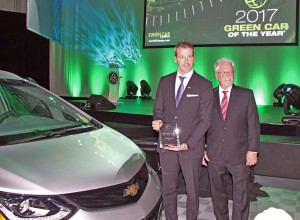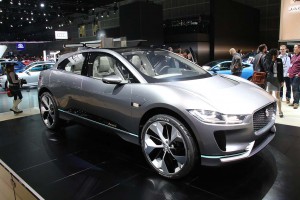
Chevrolet Bolt marketing manager Steve Majeros and Green Car Publisher Ron Cogan show off the battery-car's latest award.
The Chevrolt Bolt, the world’s first long-range, mainstream-priced battery-electric vehicle, was given another in a growing list of endorsements, being named Green Car of the Year during a ceremony at the Los Angeles Auto Show.
Organizers of the award called the Bolt a “game-changer,” suggesting that its launch will transform the public’s perception of green powertrain technology from a quirky niche to something that can appeal to everyday drivers.
“This takes battery power into the mainstream,” said Ron Cogan, publisher of Green Car Journal and the organizer of the annual Green Car of the Year award. “This is the transition year. Green technology is no longer for early adopters.”
(For more on Bolt’s awards, Click Here.)
The Chevy Bolt will reach market by the end of the year, according to parent General Motors. It joins a growing list of battery-electric vehicles, including the updated Volkswagen e-Golf and the next-generation Smart Fortwo Electric Drive also making their debuts at the L.A. Auto Show.
The latest version of the e-Golf will get a 50% bump in range, but at an EPA-estimated 124 miles, it will only be able to travel about half as far as the Bolt, which can manage 238 miles range. There are several vehicles that can run even longer, including the Tesla Model S sedan and Model X SUV, but those battery cars start at more than double the price of the new Bolt. The Chevy electric vehicle will carry a base MSRP of $37,495 – dropping below the $30,000 mark after factoring in a $7,500 federal tax credit.
“Consumers want cars that are efficient,” said Steve Majeros, the marketing executive in charge of Bolt, “but they don’t want cars that scream they are different. They just want a great car.”
(Hyundai wants you to subscribe to its Ioniq EV, not buy it. Click Here for the story.)
Unlike many early electric vehicles, Bolt is also reasonably quick, capable of launching from 0 to 60 in just over seven seconds.
In fact, manufacturers from around the world are shifting the way they design and engineer electric vehicles. The BMW 330e plug-in hybrid that vied with Bolt for the Green Car trophy can hit 60 in less than six seconds. And the Tesla Model S, equipped with its optional Ludicrous Mode, is now the world’s fastest production sedan, capable of hitting 60 in 2.8 seconds.
A wide range of automakers are planning to launch performance and longer-range battery-electric vehicles, or BEVs, over the next several years, including Porsche, Audi and even Aston Martin.
But the real “game-changer,” said Green Car publisher Cogan, is getting prices down into the mainstream. A number of automakers are targeting 200-plus range and prices under $40,000, as well. That includes Volkswagen, Ford, Nissan and Tesla.
Industry analysts say that Chevy got a leg up on its California EV rival, however, by bringing the Bolt to market almost a year ahead of when the first buyers will start to take delivery of the Tesla Model 3.
The Chevrolet Bolt’s momentum is expected to increase as a result of the awards it has been nabbing. It was also named Motor Trend Car of the Year during another L.A. Auto Show ceremony. And it was named this week one of three finalists for the North American Car of the Year, that award to be handed out on January 9 at the Detroit Auto Show.
Nonetheless, Chevy’s goals are relatively modest. The maker has not revealed its sales targets but battery supplier LG Chem recently suggested it is planning to provide enough lithium-ion cells for about 30,000 Bolts next year. By comparison, Tesla CEO Elon Musk has said he plans to sell as many as 500,000 electric vehicles in 2018, the vast majority of them Model 3 sedans.
(Click Here to check out the new Jaguar I-Pace electric.)
Many analysts remain skeptical of that goal, noting that pure battery-electric vehicles accounted for barely 0.4% of the total U.S. new vehicle market during the first nine months of this year, and even when adding in plug-in hybrids and conventional hybrids, all battery-based models garnered a meager 3% of the market.
For all manufacturers, the challenge will be not just to boost sales, said Ralf Speth, CEO of Jaguar Land Rover, but to bring costs down to the point those vehicles can generate a reasonable profit. It helps that battery prices are plunging. Jaguar showed a concept version of its own long-range battery vehicle, the I-Pace, at the L.A. show.
Lithium batteries averaged about $1,000 a kilowatt hour when Chevy launched its earlier Volt plug-in hybrid in 2009. With 60 kilowatt-hours in the newer Bolt, that would have meant the car would have come to market at barely half the price of its battery pack. But Mark Reuss, GM’s product development chief, told TheDetroitBureau.com that Bolt’s batteries are now down to around $150 per kWh.
That’s still not low enough, however. Most industry analysts believe the figure will need to drop to $100 or less to make electric vehicles both cost-competitive with conventional cars and profitable for manufacturers.



